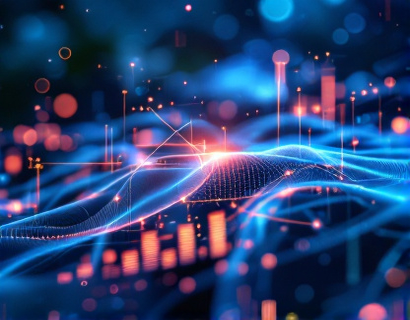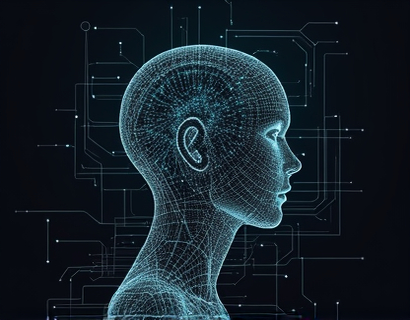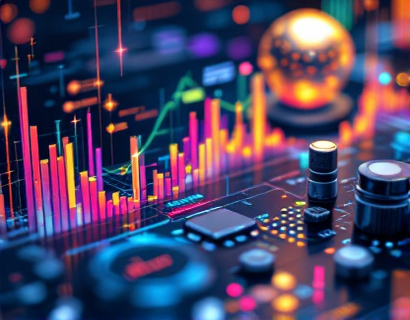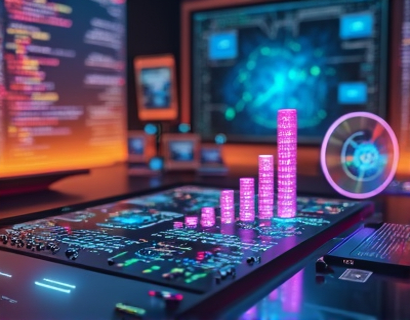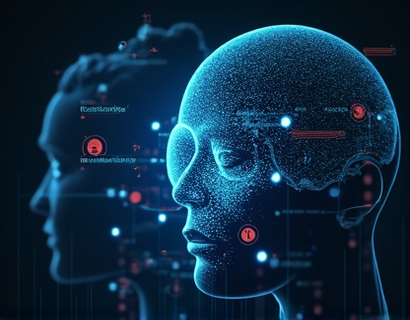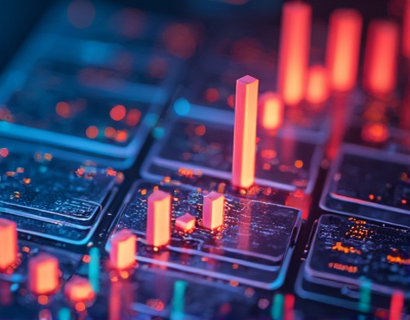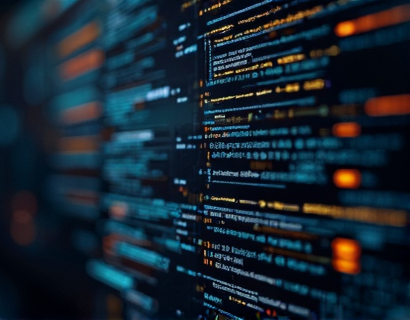AI and Crypto Convergence: Leveraging Intelligent Solutions for Next-Gen Blockchain Finance
The intersection of artificial intelligence (AI) and cryptocurrency is an exciting frontier that promises to revolutionize the way we think about finance and technology. This convergence is not just a technological curiosity but a transformative force that is reshaping the landscape of blockchain finance. As we delve into this topic, it's essential to understand the fundamental components of both AI and cryptocurrency, and how their integration is paving the way for innovative solutions.
Artificial intelligence, at its core, involves the simulation of human intelligence processes by machines, particularly computer systems. These processes include learning (the acquisition of information and rules for using it), reasoning (using rules to reach approximate or definite conclusions), and self-correction. In the context of cryptocurrency, AI can be applied to various aspects such as market analysis, trading strategies, security, and even the development of new blockchain protocols.
Cryptocurrency, on the other hand, is a digital or virtual currency that uses cryptography for security. It operates on a decentralized network, typically a blockchain, which is a distributed ledger that records all transactions across a network of computers. The most well-known cryptocurrency is Bitcoin, but there are thousands of others, each with unique features and use cases. The decentralized nature of cryptocurrency eliminates the need for intermediaries, making transactions faster, cheaper, and more secure.
The convergence of AI and cryptocurrency is driven by the need for more efficient, secure, and intelligent blockchain systems. AI can enhance the functionality of blockchain in several ways, from optimizing network performance to improving security measures. Let's explore some of the key areas where AI is making a significant impact in the world of cryptocurrency.
Enhanced Market Analysis and Predictive Trading
One of the most prominent applications of AI in cryptocurrency is in market analysis and predictive trading. Traditional financial markets have long utilized data analytics and machine learning to predict trends and make informed trading decisions. Cryptocurrency markets, with their high volatility and vast amounts of data, are an ideal playground for AI-driven analytics.
AI algorithms can process and analyze vast datasets, including historical price data, trading volumes, news sentiment, and social media trends. By identifying patterns and correlations that are not immediately visible to human analysts, AI can provide insights that help traders make better decisions. Predictive models can forecast price movements, helping traders to enter and exit positions at optimal times.
For instance, machine learning models like recurrent neural networks (RNNs) and long short-term memory (LSTM) networks are particularly effective in time series analysis, which is crucial for understanding the dynamic nature of cryptocurrency prices. These models can capture the temporal dependencies in data, making them well-suited for predicting future price trends.
Moreover, AI can enhance trading strategies by automating the execution of trades based on predefined criteria. Algorithmic trading, powered by AI, can execute trades at high speeds and with precision, reducing the emotional bias that often affects human traders. This not only increases the potential for higher returns but also helps in managing risk more effectively.
Improved Security and Fraud Detection
Security is a paramount concern in the cryptocurrency space, given the decentralized and often anonymous nature of transactions. AI plays a crucial role in enhancing the security of blockchain networks and detecting fraudulent activities. By leveraging advanced analytics and machine learning, AI can identify and mitigate potential threats in real-time.
One of the primary uses of AI in cryptocurrency security is in fraud detection. AI algorithms can monitor transaction patterns and identify anomalies that may indicate fraudulent activity, such as double-spending or phishing attacks. These systems can learn from historical data to recognize normal behavior and flag any deviations, allowing for swift action to be taken.
Additionally, AI can be used to strengthen the security of blockchain networks themselves. For example, AI-powered systems can detect and prevent 51% attacks, where a group of miners controls more than 50% of the network's hashing power, allowing them to manipulate transactions. By analyzing network activity and identifying unusual patterns, AI can help maintain the integrity and security of the blockchain.
Smart contracts, which are self-executing contracts with the terms directly written into code, can also benefit from AI. AI can help in the creation and verification of smart contracts by ensuring that all conditions are met and that the contract executes as intended. This reduces the risk of errors and malicious activities, making smart contracts more reliable and secure.
Optimized Network Performance and Scalability
As cryptocurrency adoption grows, so does the demand for blockchain networks to handle increasing transaction volumes. AI can play a significant role in optimizing network performance and enhancing scalability. By analyzing network data, AI can identify bottlenecks and suggest improvements to increase transaction throughput and reduce latency.
One approach is to use AI for consensus mechanism optimization. Consensus mechanisms, such as Proof of Work (PoW) and Proof of Stake (PoS), are critical for maintaining the integrity of blockchain networks. AI can help in designing more efficient consensus algorithms that balance security, decentralization, and scalability. For example, AI can optimize the selection of validators in PoS systems or improve the efficiency of PoW by predicting optimal hash rates.
Another area where AI can contribute is in the development of layer 2 solutions, which aim to improve scalability by processing transactions off the main blockchain. AI can help in designing and managing these solutions by analyzing transaction patterns and optimizing the flow of data between the main chain and the layer 2 network. This ensures that the blockchain remains fast and cost-effective, even as the number of users and transactions grows.
Enhanced User Experience and Personalization
The user experience in cryptocurrency is another area where AI can make a significant impact. By leveraging AI-driven personalization, cryptocurrency platforms can offer tailored services and recommendations to users, enhancing their overall experience.
AI can analyze user behavior and preferences to provide personalized insights and recommendations. For example, a cryptocurrency exchange can use AI to suggest relevant assets based on a user's trading history and market trends. This not only improves the user experience but also increases the likelihood of users engaging more deeply with the platform.
Chatbots and virtual assistants powered by AI can also enhance user support. These AI-driven tools can provide 24/7 assistance, answering common questions, guiding users through complex processes, and offering real-time support. This not only improves customer satisfaction but also reduces the workload on human support teams.
Furthermore, AI can help in creating more intuitive and user-friendly interfaces. By analyzing user interactions and feedback, AI can suggest design improvements and optimize the user interface to make it more intuitive and accessible. This is particularly important in a space where technical complexity can be a barrier to entry for many users.
Challenges and Considerations
While the convergence of AI and cryptocurrency offers numerous benefits, it also comes with its own set of challenges and considerations. One of the primary concerns is the ethical use of AI in finance. Ensuring that AI systems are transparent, fair, and free from bias is crucial to maintaining trust and integrity in the cryptocurrency ecosystem.
Another challenge is the regulatory landscape. As AI and cryptocurrency continue to evolve, regulators are grappling with how to address these new technologies. Compliance with regulations is essential, and AI can help in navigating the complex regulatory environment by providing tools for monitoring and reporting activities.
Data privacy is also a significant concern. AI systems require large amounts of data to function effectively, and the use of personal data must be handled with care to protect user privacy. Implementing robust data governance practices and adhering to privacy regulations is essential to building trust and ensuring compliance.
Finally, the technical complexity of integrating AI with blockchain systems can be a barrier for some organizations. Developing and maintaining AI-powered solutions requires specialized skills and resources. Collaboration between AI experts and blockchain developers is crucial to overcoming these technical challenges and realizing the full potential of AI in cryptocurrency.
Future Prospects and Opportunities
The future of AI and cryptocurrency convergence is bright, with numerous opportunities for innovation and growth. As AI technologies continue to advance, we can expect even more sophisticated applications in the cryptocurrency space.
One exciting area is the development of decentralized AI models. Traditional AI relies on centralized data and computing resources, which can be a bottleneck and a point of vulnerability. Decentralized AI, powered by blockchain, can distribute data and computation across a network, enhancing privacy, security, and resilience.
Another promising direction is the integration of AI with other emerging technologies such as the Internet of Things (IoT) and 5G networks. The combination of these technologies can lead to new use cases in areas such as smart contracts for IoT devices, real-time data processing for financial services, and enhanced security for connected systems.
Moreover, the rise of decentralized finance (DeFi) presents a fertile ground for AI applications. AI can optimize DeFi protocols, improve risk management, and enhance user experiences in decentralized lending, borrowing, and trading platforms. The synergy between AI and DeFi has the potential to create more efficient, accessible, and innovative financial systems.
In conclusion, the convergence of AI and cryptocurrency is a dynamic and rapidly evolving field that holds immense potential for transforming the financial landscape. By leveraging intelligent solutions, we can build more efficient, secure, and user-friendly blockchain systems. As the technology continues to mature, it is essential for tech enthusiasts, professionals, and stakeholders to stay informed and engaged in this exciting journey.




